Survivors is a classic BBC drama series from the mid 1970s. It depicts life in Britain in the aftermath of a plague that wipes out 99.99% of people. The survivors now have to survive in the world that follows.
Survivors is unusual in two ways. One is the production style (more below). The other is that it was quite obviously overseen by a conservative. The producer Terence Dudley must be the last conservative to ever have any authority at the BBC. Throughout, Survivors shows a faith that social hierarchy is both inevitable and necessary. Characters, while well-written, fall squarely into class categories, with the working-class being feckless (though often loyal and practical), the middle-class being honest and sensible, and the upper-class being the most far-seeing, talented and resilient. There is also:
deep skepticism about human nature
pessimism about technology
an understanding that feminism is a luxury creed
an understanding that men and women are different. When something technical needs to be built or fixed, it’s going to be men who do it. When something organic needs to be maintained, it’s going to be women who do it.
a belief that man cannot live by bread alone (indeed, one episode actually has that title)
Needless to say, none of these things would appear in a drama today.
For its first six episodes Survivors followed the standard production practice of the time - studio (video) and location (film) - but then it switched to a highly unusual experimental mode: shot (almost?) entirely on location, and on video rather than film.
As a result, Survivors has an aesthetic that is pretty much unique: wintry English landscapes shot on mid 1970s video. It looks more like a news report than a drama. Since the cameras were soon obsolete, this aesthetic was never reproduced.
Completing the show’s look is the titling, in Futura Bold - cold, ominous, industrial, and certainly mid 1970s.
With all this, Survivors feels like a snapshot of a moment in time - even though it’s a moment that didn’t really happen. This is an alternative 1975, one which will emphatically not lead to the 1980s or the 1990s that you and I know.
All of season 1 is good. I especially like the early episodes when people are still shell-shocked and social organisation is rudimentary and febrile. The second half of this season concerns the founding of a community - the location settles, the production mode changes, and it is quite a different show, but still very good.
Season 2 is the weakest of the three - directionless and rather anodyne - but it does have a few good episodes. However, I really resent that they just discard the achievements of Season 1. That was a mistake in my opinion.
Season 3 is a mess but far more interesting than its predecessor. It has a dark, gritty atmosphere that is distinctive and memorable. That atmosphere is partly caused by the low picture quality, since by now the cameras were worn out.
Season 1
The Fourth Horseman
This episode is unique because it has to set up the show’s premise, which in this case means transitioning from “normal 1975” to the post-plague world that will later be explored. Terry Nation’s script achieves this transition with just 50 minutes and a tiny BBC budget - great stuff! The unfolding catastrophe, gradually wiping people out, slaying infrastructure and transforming life on Earth, is expertly depicted using minimal resources.
We don’t see it at the government level but instead through the eyes of ordinary people, living in gritty London and an idyllic rural village. Most of the people we see frantically trying to understand and react to the disaster will have perished by the end of the episode, but two among them will survive and eventually meet up with Greg to form the show’s principal trio.
Carolyn Seymour is on top form in this episode. There are also lovely turns from Peter Bowles and Peter Copley. And look out for Len Jones, the voice of Joe 90, as one of the youths harassing Jenny.
Genesis
This is worth watching for two things above all. First, a scene where Abby ponders the challenge of making a simple table knife, brilliantly illustrating the gravity of the situation that the survivors have been plunged into and will be contending with for the rest of their lives. Second, there is a character who, before the plague, was a trade union president and, after, has immediately set himself up as an authoritarian thug.
Gone to the Angels
I love this episode for a conversation that Abby has with a Christian holy man. She tells him that she can’t love God because she doesn’t understand God. The man replies: “Did you have to understand your husband and your son before you loved them?” Survivors is a show of bleakness and desolation, but in these early episodes it seems to be reaching for hope - of a spiritual kind. (In later seasons the hope will be only material.)
Garland’s War
The last episode before they switched to all-video, this sees an aristocrat trying to recapture his ancestral estate from a group of bandits who have seized it. Good stuff, and I like the cosy set for his underground hideaway.
Revenge
Any man who has, at some point, felt utterly disrespected by a woman to whom he was devoted will understand this episode. Over and above that, it is a study of anguish, revenge and jealousy. A loving but tormented man makes peace with a young woman’s ruthlessness. (This episode follows on from Genesis and Spoil of War, which you might want to watch first.)
Law and Order
A lot of liberal-minded people love this episode, seeing it as an effective refutation of capital punishment. A character is sentenced to death for a crime it turns out - too late - he didn’t commit. I find this rather shallow as a critique of the death penalty (most supporters of it already know that, on very rare occasions, it will be wrongly applied). Nevertheless, this is a good story and a decent examination of the moral problem. I just think the conclusion it pushes you towards is the wrong one, and that it does so using the edgiest of edge-cases.
Season 2
Lights of London (Part 1, Part 2)
This is the only two-parter in Survivors, and the only time London is revisited after the first episode.
The depiction of London is very good, both on location and (apparently) in studio. I think this story must have consumed much of the season’s budget and all of its studio time; nothing else in the season looks studio to me.
The story offers a unique glimpse into how an urban community fares in the post-plague world. City living is dangerous, but there are amenities, infrastructure, stockpiles, resources and complex enclosed spaces (eg. tube stations) that cannot be found in the countryside. As a result, you get a sense that this community is operating at a scale considerably larger and more elaborate than the rural ones we have seen. (As in normal life, everything in London is a bit “bigger” than usual.)
Finally, without spoiling the story, I love the concept of a community leader who actually doesn’t want his community to succeed. It’s a very intriguing idea. The script was by a Jewish writer, and I can’t help wondering what he was up to giving said community leader an obviously Jewish name - and they even chose a Jewish actor to play him! (Then again, the “goodie” who defeats him is also played by a Jewish actor.)
The Chosen
One of the best things about Survivors is seeing the different approaches possible to running a community. This episode visits a militaristic settlement, and is interesting as a study of power dynamics. It is reminiscent of The Crucible with people frantically accusing each other of corruption. You get the sense that, power being so attractive to some people, they will readily lie about each other in competing over it, while ordinary (non-sociopathic) people are bombarded by the resulting noise and end up simply being tricked by whoever is the better trickster.
Parasites
This isn’t a great episode, but I like it anyway because of Patrick Troughton (who is always a pleasure to watch) and the canals, which I’m surprised didn’t feature a lot more in this show. Also, it’s nice to see a pair of wretches getting what they deserve.
Season 3
This is generally considered one of the best episodes, possibly the best. It is an excellent 50 minutes of drama, following a simple premise and a simple storyline, but with gusto and intensity. There is chilly landscape scenery, and terrific acting from the two leads - Denis Lill and, appearing sadly in this episode only, Morris Perry. It is bleak stuff but incredibly well done. There is even, between the urgency and the very low budget, a certain artistic style that emerges subtly here and there. This is why it rises above the rest of Season 3; beset with a tiny budget, those other episodes “make do”, while Mad Dog almost seems to revel in it.
The Enemy
As our characters find a way to possibly restore some semblance of industrial society, one man emerges who opposes the idea. His motive is a fascinating one. Frankly, it isn’t as well-handled as it should have been, but it is still great to watch.
The Last Laugh
Written by star Ian McCulloch, this is in some ways a vehicle to make him look “cool”, but it is an excellent episode - a tale of honour, resourcefulness, courage and self-sacrifice. The plotting is admirably tight with hardly a superfluous line of dialogue in the whole thing.
Episodes with film bits
The first six episodes of Season 1
Lights of London
The Chosen
Episodes with ethnic minorities
A Beginning
Lights of London
The Last Laugh
Other “OB” shows
Many people wrongly believe Survivors is unique in being shot on video on location (“OB”). In fact quite a few dramas were made this way around that time. Manhunt was probably the first, made in 1969 with the clunky EMI-2001. By the mid ‘70s smaller, more portable video cameras were available. This is why Survivors switched to OB along with some other productions, including:
Upstairs Downstairs (1971)
New Scotland Yard: Nothing to Live For (1972)
Murrain (1975)
Doctor Who: The Sontaran Experiment (1975)
The Siege of Golden Hill (1975)
Beasts (1976)
Bill Brand (1976)
Clayhanger (1976)
Love for Lydia (1977)
The Omega Factor (1979)
Funny Man (1980)
Boys from the Blackstuff (1981)
The Nightmare Man (1981)
See my other TV guides here.


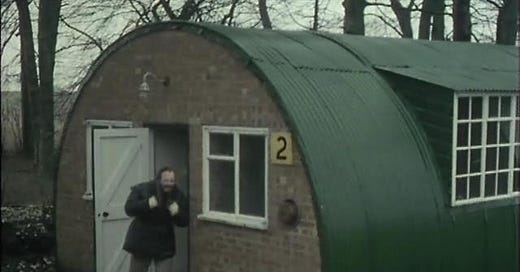

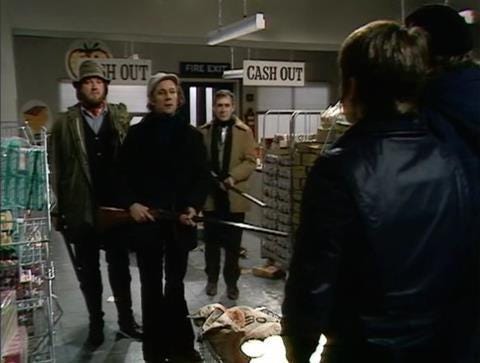
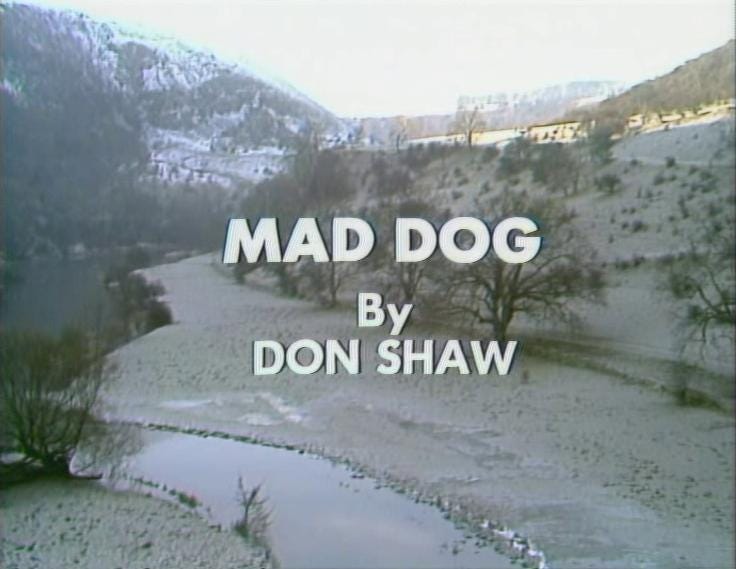
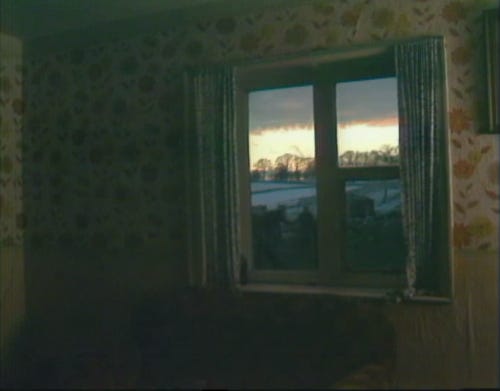

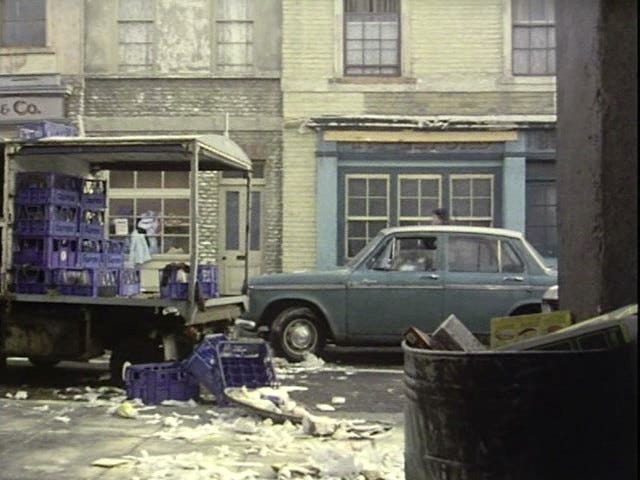

Thanks for writing this. I watched "Survivors" in 1975 as a 10 year old and it blew my mind. I made sure I watched every episode. Recently I got the DVD. Viewing it now, (as you say) the series is a fantastic time capsule of 1970s pre Thatcherite Britain. This was a wonderful place/society to live in because I lived In it and remember it well. 1970s Britain was paradise. I would also include the 1970s "All Creatures Great and Small" with this aesthetic and ideology? Perhaps the 1970s "Survivors" production aesthetic and writing could form the basis of a new British Nationalist screen revival, with mainly all white cast, traditional gender roles etc? Making videos like this would certainly be a lot cheaper than the over-produced media garbage of today? Even the most basic video cameras (eg: on an iPhone) are better than the BBC video cameras of the 1970s. Series like "Survivors" should inspire a new generation of nationalist film-makers in 2025? We can dream like that again.
About the classes, I would say they would be up ended in a global catastrophe, with those that can do with their hands, the practical skilled, those who know the countryside, would be the most valuable members. Someone like that verses a city banker, well, the city banker would be subservient, unless of course his hobbies included fishing and bow hunting.